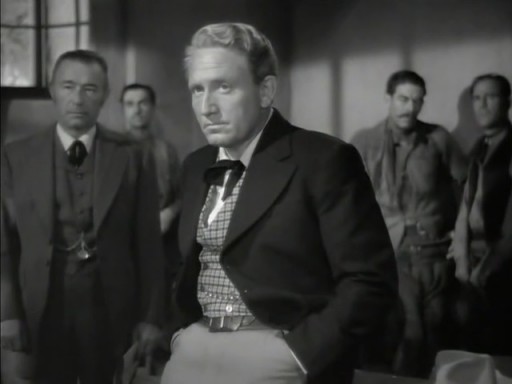
Black Narcissus (1947, UK, Powell & Pressburger) – Deborah Kerr goes to start a nunnery in an abandoned palace in the Himalayas, where something about the air, the mountains, and the erotic paintings on the walls reminds the nuns of earthly pleasures and the lives they left behind. This is not a horror movie, which may be why it’s so scary. Watched it all.
Record of a Tenement Gentleman (1947, Japan, Ozu) – A homeless boy shows up in a neighbourhood, and nobody wants to help him. They have enough to worry about already, what with no longer being able to reap the benefits of the greater Asian prosperity sphere. Watched: 19 minutes.

The Sea of Grass (1947, USA, Kazan) – Interesting: A western where the uncaring big landowner is mostly in the right, the poor homesteaders who want a share of his land are misguided, and the idealist who opposes him is kind of an asshole. Katharine Hepburn befriends all three, trying to bridge their opposing interests, but fails. I guess the movie does too, but I like what it could have been. Watched it all.
The October Man (1947, UK, Baker) – I was hoping the traumatic accident John Mills is in would give him an interesting case of madness, but he’s just a little sad, and keeps getting better. Watched: 21 minutes.
Heaven Only Knows (1947, USA, Rogell) – Another of those movies where the amusingly bureaucratic angels of Heaven interfere with events on Earth. Watched: 7 minutes.
Hmm, yes, Ozu is regarded as one of the great japanese, no great success in the west.
Kazan is not so well known as a director, although his Tennessee Williams’ directions and of course East of Eden are.
Elia Kazan not so well known ?
I thought he was. In addition to those you mention, he directed ‘On the Waterfront’ with Marlon Brando, and ‘Splendor in the Grass’. ‘On the Waterfront’ is surely one of the big ones in movie history.
Actually Kazan may be best remembered today for his testimony to the unamerican activities committee, where he revealed the names of people he knew when he was in the Communist Party.
Having seen some of the pro-Communist movies made during the war, I’m a little bit more sympathetic to people who did that. Mission to Moscow, for instance, shows Stalin as the kind, wise father of Russia. The tragedy is of course that such movies were made with official encouragement, (and also that McCarthy was insane etc.)
Pingback: 40′s movies marathon – best of 1947 « Bjørn Stærk's Max 256 Blog
Pingback: 40′s movies marathon – the most memorable movies of the decade « Bjørn Stærk's Max 256 Blog